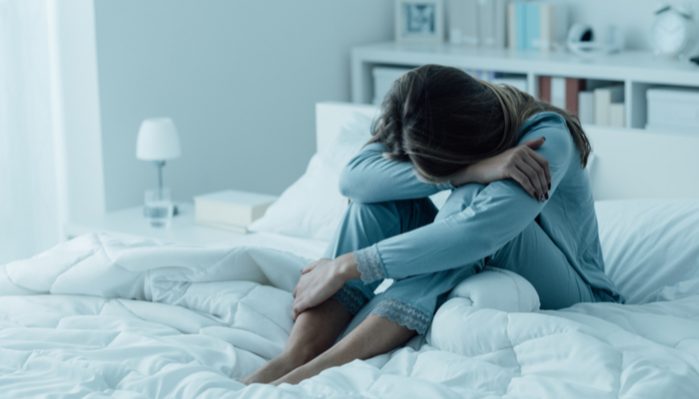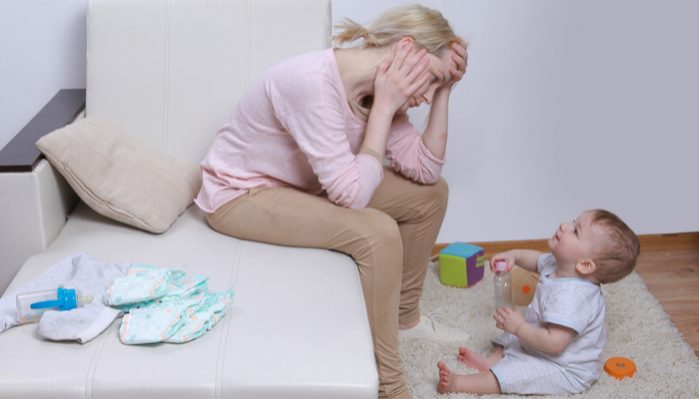Everyone goes through highs and lows at various times in life. There are often bumps in the road along the way which throw us off and cause emotional upset. How do we know if we are experiencing temporary sadness, or if it’s a deeper issue like depression? In this article, we’ll talk about some of the signs of depression to watch out for.
What is Depression?

Depression is a widespread, but serious medical illness. Depressive disorders were the second leading cause of years lived with disability in 2010 in Canada, the United States and globally.[1]
Depression cannot simply be “shaken off,” and individuals cannot “try harder to be happier.”
Signs Of Depression
- Continuous feelings of sadness, hopelessness, guilt or anxiety.
- Lack of interest in things you once found enjoyable.
- A serious change in sleep pattern: insomnia, or sleeping too much.
- Fatigue, physical symptoms such as pain with no known cause.
- Unable to concentrate or make decisions or forgetfulness.
- Appetite changes resulting in serious gain or loss in weight.
- Physical aches and pains
- Feeling as though life is pointless, or having suicidal thoughts.
Aside from these signs of depression, another means to identify depression is explored in this article regarding the speech an individual uses to communicate.
Depression and Gender
Is there a difference in the way depression presents itself in women vs. men? Signs of depression can manifest in different ways for different genders. Depression is triggered by different factors in men and women. Internalizing factors such as social or relationship issues are most common causes in females. Men are more likely to present with externalizing indications, stemming from career and goal influences.[1] Men are prone to suffer in silence without seeking help. Despite this fact, each year 6 million men in the U.S. suffer from clinical depression.[4]
Studies show that clinical depression is twice as common among women as in men.[1] Unipolar depression <a persistent feeling of sadness or a lack of interest in outside stimuli> is twice as prevalent in women as men. It is forecasted to be the second leading source of global disability burden by 2020![5]
Causes of Depression
Chemical Imbalance?
At one time there was a theory that a chemical imbalance in the brain was responsible for depression.
Hereditary Disposition
A family history of depression is a contributing factor for both males and females. There is a significant risk to individuals with a family member who suffers from depression. [6]
Situational Depression
Going through a stressful time in life such as a divorce, job change, or moving can cause temporary depression. The depression is usually alleviated once the adjustment period is reached.[7]
Culture and Circumstances
- Discrimination
Both males and females can be subjected to racial or cultural discrimination. This leads to lowered self-esteem, a contributing factor to depression. Women are more likely to live in poverty than men adding worry about their future.[3]
- Overworked
Women handle a large number of household responsibilities despite the fact that they may also work full time outside the home. Slowly a shift is happening to equalize the tasks between the parents. [3]
Others are single parents juggling multiple jobs to keep the household running. Many function as caregivers to sick or disabled children or older family members [3].
Check out these articles for some great tips on how to have a conversation about equal division of household chores: Parenting Advice and Studies Show That Husbands Stress Women Twice As Much As Children.
Hormonal Differences
Depression manifests most when women go through hormonal changes such as: [3]
- Puberty
Hormonal changes in combination with coming of age issues, clashing with parents, increased responsibilities and pressure can cause depression in teenagers.[3]
It’s a good idea to nip any concerns in the bud by screening during pre-teen and teenage years. This article is an excellent read for more information on screening for depression in teens.
- Prior to menstruation
Alteration of estrogen, progesterone and other hormone levels affect mood. Premenstrual syndrome (PMS) usually causes temporary symptoms. Some women have more extreme reactions. Premenstrual dysphoric disorder (PMDD) usually requires treatment for depression.[3]
- Pregnancy
Mood is drastically affected during pregnancy due to major hormonal changes. Other factors may be present such as: [3]
- Leaving work or other lifestyle changes
- Problems in a Relationship
- Unintended pregnancy
- Miscarriage
- Ceasing use of medications

- Postpartum depression
Following pregnancy, it is normal to have the “baby blues” for a few weeks. However major hormones, complications with birth or lack of support are contributing factors to developing postpartum depression.
These signs of postpartum depression indicate a need to seek help: [3]
- Difficulty functioning on a daily basis
- Cannot care for your baby
- Thoughts of harming your baby or yourself
- Perimenopause
During this stage in a woman’s life estrogen levels are significantly reduced. When found in combination with these other factors this can lead to depression: [3]
- Poor sleep
- Anxiety
- Life stressors
- Weight gain
- Early onset of Menopause
- Surgical removal of the ovaries leading to menopause
Genetics
The genetic makeup of women is under evaluation as a link to the higher occurrence of depression. Biological factors, such as an estrogen decrease in the body, may add to the increased frequency of depression and anxiety in women. [1]
Pre-existing or Resulting Conditions
There are other conditions that co-exist with depression which also must be dealt with: [3]
- Anxiety
- Eating disorders such as anorexia and bulimia
- Substance abuse of drugs or alcohol
Many people are worried about coming forward with their feelings of depression. One concern is being prescribed a drug with worse side effects than their depression. To explore some drug-free remedies for depression have a look at this article on beating depression naturally.
There are many stigmas associated with mental health issues, but with awareness, we are starting to break these down. Programs such as the Bell Canada, Let’s Talk day, and Mental Health Awareness Week exist to bring attention to the issue of depression.
If you or someone you know is suffering from depression please reach out to a crisis line in your area. Here are some helpful numbers and links:
National Suicide Prevention Lifeline
In USA call: 1-800-273-8255
Depression Hotline
In USA call: 1-866-208-4949
Crisis Text Line
In USA text: 741741
Anxiety and Depression Association of America
Kids Help Phone
In Canada call: 1-800-668-6868
Crisis Services Canada
In Canada call: 1-833-456-4566
Canadian Association for Suicide Prevention
Mood Disorders Society of Canada
Disclaimer: This information is not intended to be a substitute for professional medical advice, diagnosis or treatment and is for information only. Always seek the advice of your physician or another qualified health provider with any questions about your medical condition and/or current medication. Do not disregard professional medical advice or delay seeking advice or treatment because of something you have read here.

